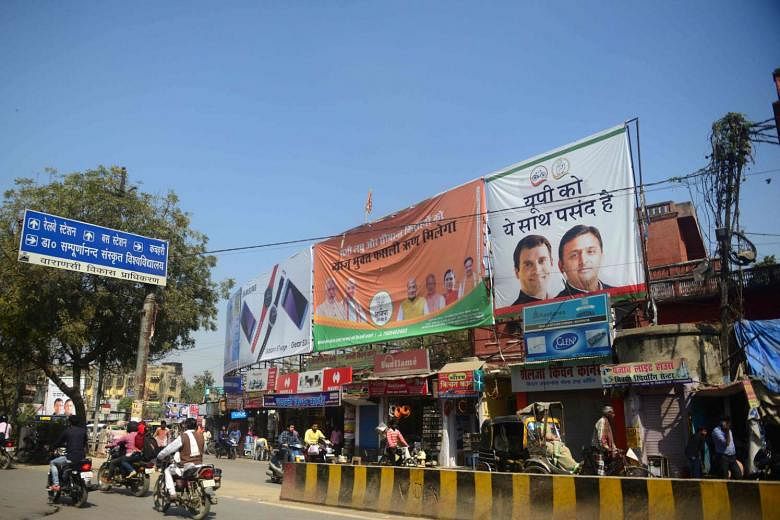Asia News Network commentators from India, Nepal and Thailand discuss the changing politics in their home countries. Here are excerpts:
Perform or perish
Subrata Mukherjee
The Statesman, India
From 2004 to 2014, former Indian prime minister Rajiv Gandhi's son Rahul was projected as a person waiting to take over the mantle of his party, the Indian National Congress. His abilities remained untested and the result was the party's humiliating defeat in 2014, securing only 19 per cent of the votes while the BJP won 31 per cent.
The factors that led to the debacle of the Congress party were never seriously analysed. Apart from corruption and alleged policy paralysis, Congress overplayed the card of identity politics.
In the recent Legislative Assembly elections in five states, attention was riveted to Uttar Pradesh because the state sends 80 members to the Lower House. The BJP's spectacular victory has thrown up the serious limitations of identity politics.
The biggest gain in the recently concluded elections is the phenomenal rise of undecided voters, who defied their group identities and voted according to their judgment.
The age of mature voting has arrived in India and all political leaders and parties are on notice. Perform or perish is the new reality.
The BJP has emerged as a pan-Indian party. The Congress party is down but not out. It won Punjab state on its own strength.
However, the further decline of the Congress party is worrisome as this would weaken the foundations of our democracy.
A serious introspection is necessary for the Congress party about its present dynastic leadership which has failed to deliver.
In search of an election
Editorial
The Kathmandu Post, Nepal
A number of recent events in Nepali politics will likely have momentous consequences. First, six of the seven parties in the Madhesi Morcha (an alliance of seven political parties that has been protesting against Nepal's Constitution since 2015) united to form the Rastriya Janata Party.
The second momentous event was the agreement reached between the government and the Sanghiya Gathabandhan (or Federal Alliance, a grouping of parties based in the Madhesh region that withdrew anti-poll protests following the agreement).
This is a singularly important event as it achieved what the parties had long failed to do.
The Madhesi parties have now agreed to a constitutional amendment, which will include various measures, the most important of which is the establishment of a Federal Commission that will make a final decision on the revision of state boundaries. In addition, the parties have agreed to increase electoral constituencies and local body units in the Tarai region.
With this agreement, the Madhesi parties have decided to participate in elections, which will now be held in two phases.
This decision finally paves the way to healing the rifts between Kathmandu and the Madhes people. Alienation and anger towards the state among the Madhesi people deepened in 2015, when the Constitution was passed.
With an agreement, the Madhesi parties can finally begin to engage in the mainstream political process and revitalise democracy at the grassroots through local elections.
Still, our optimism is tempered with caution. For this agreement is only the beginning of the process - it does not resolve all outstanding problems.
What's missing in Thai democracy
Tulsathit Taptim
The Nation, Thailand
A lot of "fighters" are crying for the missing plaque, but not everyone in this country is crying over the missing ingredients of true democracy. (The plaque, which commemorated the overthrow of the absolute monarchy in 1932, disappeared and was later replaced.)
What differentiates democracy from other political systems is that it does not really need a symbol. The Michael Douglas character in the Hollywood blockbuster, The American President, hit the nail on the head when he said - in defence of his girlfriend who had joined protesters in burning the United States flag - that the true spirit of advanced, democratic citizenship lies in tolerance of hostility and ideologies that do not conform to your thinking. That statement could be applied to the "missing plaque" in Thailand.
The essence of his remark is this: For democracy to thrive, the onus is not on the flag burners, but those who may not like what the former do but accept their right to do it anyway. If that is a great summary of true democracy, then we obviously have a lot of problems in Thailand. Tolerance here is minimal. People describing themselves as "pro-democracy" give symbols too much importance.
Charges of untoward conduct are easily dismissed, not by evidence to the contrary, but by how much power one has in Parliament. In short, the pro-democracy movement in Thailand is in danger of becoming its own worst enemy.
The right to cry foul over the missing plaque is embedded in democracy. But it has to be a healthy democracy with an efficient system of checks and balances, a respectable legislature and properly functioning courts of law.
We can place the plaque back where it was and surround it with the best anti-theft barricade in the world, but that does not mean our on-and-off democracy will suddenly be all right.
True democracy is saying: "History is nowhere near as important as the future, because while the other systems can afford a comfort zone, we cannot."
And true democracy is saying: "Even though the other systems cannot tolerate us, we will tolerate them."
- The View From Asia is a weekly compilation of articles from The Straits Times' media partner Asia News Network, a grouping of 22 news media entities. For more, see www.asianews.network

